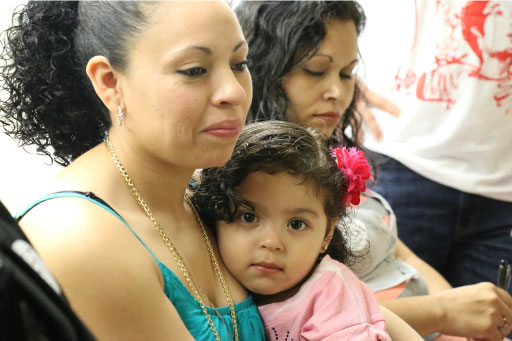
An undocumented mother of two who pled guilty to a traffic violation is being detained by federal immigration authorities in Virginia after her regular check-in with those officials.
Liliana Cruz Mendez, whose 10-year-old son and 4-year-old daughter are both U.S. citizens, was pulled over in 2013 because of a problem with the headlights on her car. Because undocumented immigrants aren’t allowed to get a driver’s license in Virginia, she pled guilty to a misdemeanor offense of driving without a license and paid a $100 fine.
At the time, then-President Barack Obama allowed federal law enforcement agents significantly more discretion in deportation cases, and Mendez was allowed to go free.
“When people hear ‘criminal alien’ they think of a murderer,” said Nick Katz, legal manager of the immigrant rights organization CASA, which is helping to represent Mendez. “Her crime is that she couldn’t get a driver’s license.”
Immigrant rights advocates have said that Immigrations and Customs Enforcement (ICE) has radically expanded its criteria for what counts as a “criminal” offense under President Donald Trump. Federal immigration agents have been significantly emboldened by the Trump Administration, and arrests of undocumented immigrants have increased since Trump took office. ICE agents have arrested 40,000 people since Trump’s inauguration, a 38% increase over the same period last year. “ICE exercised prosecutorial discretion on two previous occasions by granting Ms. Cruz-Mendez a stay of removal in June 2014 and May 2015,” ICE spokeswoman Carissa Cutrell said in a statement.
Mendez fled El Salvador in 2006 at the age of 18, after she was threatened at gunpoint by a man who wanted her to be his girlfriend, Katz said. When she arrived in the United States, she didn’t understand the nuances of the immigration system, and she didn’t have a lawyer — so, when she was called into an immigration hearing in Texas, she didn’t appear for her hearing. That resulted in an in-absentia order for her removal.
“Under the Obama Administration, she would have been eligible for DAPA,” said Katz, referring to the stalled Obama-era policy that would have allowed some parents of children born in the U.S. to stay in the country even if they were here illegally. “But unfortunately it has been very difficult in this Administration to get them to exercise any form of discretion, even though it’s within their power to do so.”
Katz said CASA has issued an application for a stay of removal, but that Mendez could be deported at any time. Because of her in-absentia order, she doesn’t have any rights to a formal hearing. If that happens, he said, it would mean she would have to choose between taking her children out of school in the U.S. and bringing them back to El Salvador — where gang crime remains a persistent problem — or permanent separation from them.
Yanira Martinez, a family friend, said that the age difference between Mendez’s children meant they had radically different levels of understanding of what was happening. Her son, who is 10, knows a bit more about his mother’s situation. “In his face you could tell that he was very scared,” said Martinez, 42. But her four-year old daughter, Martinez recalled, said “mama will be right back.”
More Must-Reads From TIME
- The 100 Most Influential People of 2024
- Coco Gauff Is Playing for Herself Now
- Scenes From Pro-Palestinian Encampments Across U.S. Universities
- 6 Compliments That Land Every Time
- If You're Dating Right Now , You're Brave: Column
- The AI That Could Heal a Divided Internet
- Fallout Is a Brilliant Model for the Future of Video Game Adaptations
- Want Weekly Recs on What to Watch, Read, and More? Sign Up for Worth Your Time
Write to Charlotte Alter at charlotte.alter@time.com